Northern Uganda: SOS Children becomes a permanent fixture
19/10/2006
Northern Uganda is on its way to peace after 20 years of war. An agreement made between the Lord's Resistance Army (LRA) and Museveni's government at the end of August has given the long-suffering Ugandan people good reason to hope for an end to displacement, abduction and mass murder. Two members of our charity's staff made their way to the north of the country that has been blighted by Africa's longest conflict. Hilary Atkins, one of SOS Children's regional editors, describes the changes that have taken place since her last visit.
Report from Gulu, Uganda
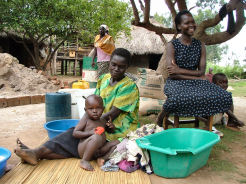
We leave Entebbe, a 20 minute drive from the capital Kampala, for Gulu in the north at 7.30am. The 340km journey takes about four hours, but getting through the rush hour traffic of Kampala can add up to an hour to the journey. The road from Kampala is fairly good, and although deep potholes appear unexpectedly, our sturdy four-wheel drive skims over them.
This is my fourth visit to Gulu. I first went in January 2003 at the height of the conflict, when the LRA was rampant in the countryside around Gulu, attacking villages and displacement camps and kidnapping children for use as child soldiers and sex slaves. That was the year that the children began their now famous 'night commutes' - walking into the safety of town every night and sleeping in bus stations, churches, hospitals and on pavements, only to return home early in the morning. It was a solemn, yet dignified nightly procession, and it drew the attention of the world's press to northern Uganda, far better than any politician could.
Signs of confidence
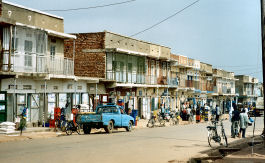
Uganda is a fertile country, evident by the lush fields and large rural population. There is comparatively little traffic the further north we go, and what there is consists mainly of four-wheel drives emblazoned with the names of aid organisations, giant buses and bicycles carrying anything from a mobile shop to half a tree of green bananas. Many people are on foot and that's a good sign - they must feel safe.
My colleague, the National Director of SOS Children's Villages Uganda and a frequent visitor to the north, remarks on the lack of military check points on the road - a sign of confidence perhaps (although he adds that we can be sure that the army will be somewhere close by).
Karuma Falls is my landmark. The road crosses the falls about an hour from Gulu; sprays of white water plummeting towards Sudan where the White Nile meets the Blue Nile on its way to the sea. Once a tourist attraction, the Karuma Falls instead marked the boundary between safety and danger, the known and the unknown. Three years ago the LRA could have been camped anywhere, even in the high grasses bordering the highway. Attacking commuter buses was one of their trademarks, so on previous visits I travelled this road uneasily. But today it feels good and the only uneasy thing about the Falls is the unusually low level of water.
The closer we get to Gulu, the more the roadside population grows. Displacement camps, once limited to the north of Gulu have sprouted on this side of town. They do not seem to be as officially organised as some I have seen, but their safety is in their numbers and proximity. Four years ago pedestrians walked this road at their peril, but today they stride purposefully forward, heading for the market, the school, the hospital. This is the surest sign yet that northern Uganda is reverting to normality after the brutality of a 20-year-insurgency that has targeted the poorest and most vulnerable of the population.
Despite its associations, I like Gulu. It's a small industrious town, so small that you can walk from one end to the other in 20 minutes, and ironically it feels very non-threatening. With such small distances, bicycle and motor bike taxis proliferate but the relatively few motor vehicles, usually large and air conditioned, are kings of these small roads.
A temporary village, but palace to some
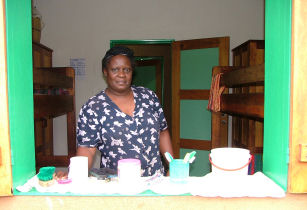
The SOS Children's Village is located on the edge of town in temporary premises which, due to their solidity, feel quite permanent. Two long low buildings house small bedrooms where the children sleep with their SOS mothers. The rooms are a little cramped but still comfortable and to some of the children must feel like a palace. A number of these children were born in the bush to young child soldiers killed on the battlefield; some were found lying beside their dead mothers and others were deliberately sent back to Uganda by their LRA fathers, knowing that without their mothers, their chances of survival were slim. Other children are victims of the general situation, orphaned by war, or HIV/AIDS, or other common diseases like malaria.
The village initially opened in a temporary house where over 40 children slept in four bedrooms - it was emergency relief in its most literal sense, giving shelter and care to children found in reception centres, in the hope that one day they would be reunited with their families. Now there are over 100 children in a larger temporary facility and it is clear that for some, reunification will never happen. Two-year-old Susan, for example, was found in the remnants of a displacement camp where the rest of her family was killed in an LRA attack. When the Village Director saw her at the hospital she was injured and afraid, but today she is the delight of the village as she strides across the grass towards the day care centre - as secure as any two-year-old could be.
Some good news
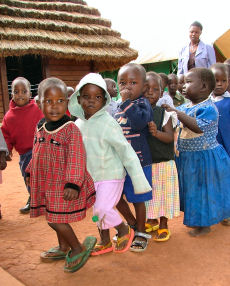
The good news, though, is that since January the Village Director has united five children with members of their biological families. With the situation becoming more stable, he has been using all available means to trace families and three more children are likely to be reunited with their families once final checks are made. The Director stresses that that is not the end of the matter - he will continue to follow up on the progress of the children and in some cases SOS Children's Villages is providing educational support.
The other piece of good news is that SOS Children's Villages has now acquired some land to build a children's village in Gulu ensuring a permanent home and long-term support for those children without families to care for them. Construction should start by the end of the year.
The temporary village, however, is still likely to remain the focus of attention in Gulu, housing as it does a medical centre, a social centre and a day care centre, all for the use of the community at minimal cost. The medical centre currently sees over 50 patients a day, some from as far as Kitgum, 50km away. With the on-site laboratory, equipped to test for HIV as well as other standard diseases, the premises are becoming too small and expansion is inevitable. The social centre targets vulnerable people in the community, in particular child-headed and grandparent-headed families, former child soldiers and single mothers. Training is currently offered in tailoring and agricultural skills, while school-age children are supported with school fees, supplementary food and regular visits from social workers. The day care centre, meanwhile, is open to children from two to six years old, allowing parents to go out to work.
Since my last visit a year ago there are more signs of permanency. The day care centre, once under canvas, now has three permanent classrooms and there is also a large recently built basketball court near the medical centre, which is used by youth from the community. The place is buzzing with activity, especially when the SOS children come home from school and dominate the playground.
SOS Children's Villages - there for the long-term
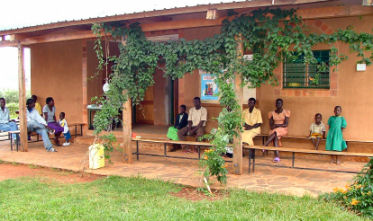
Before we leave Gulu we pay a visit to the elected local leader of the municipality - a lawyer and former Member of Parliament, known officially as the 'LC5' (LC5 is the district level in Uganda). He warmly receives our delegation of four and is complimentary about the work of SOS Children's Villages.
The leader is aware that in a town with the highest number of NGOs in Uganda, many of which come and go within months, SOS Children's Villages is in it for the long-term offering sustainable family care and ancillary services to the local population. He is right - SOS Children's Villages is now a permanent fixture on the Gulu landscape and I am already looking forward to going back to see the growth and the progress that will inevitably be made in the next 12 months.
Relevant Countries: Uganda.